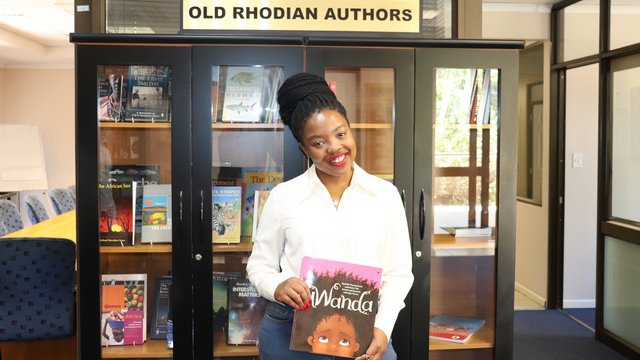
Rhodes University student writes a children’s book that teaches learners about their identity
When Mathabo Tlali dropped out of Rhodes University six years ago, she never expected she would have the courage to go back to university. This was after she failed her final year twice for her Bachelor of Arts in drama and sociology degree, and was academically excluded. But that’s history. Mathabo is back on campus to finish her three year degree. It is thanks to her high school friend Sihle Nontshokweni, the co-author of their newly published book called Wanda.
King William’s Town based Mathabo was battling to cope with severe depression after dropping out of Rhodes University for more than four years when Sihle suggested that they write a children’s book. This was the same year when Pretoria Girls High School parents and learners were up in arms, demanding a review of the school policy on African hair. It was in August 2016 that black pupils at the school protested against the school’s code of conduct, saying it imposed unfair restrictions on how they could wear their hair.
Published by Jacana Media, as part of a story writing competition, the 29 page children’s book is a story of how Wanda, a primary school learner, was humiliated by her peers on her school bus trip every day for her natural hair. This went on until her grandmother showed her how to plait her hair and taught Wanda to be confident in her natural hair.
Mathabo said the book took them less than a day to write, because these were some of their personal experiences while at Kingsbridge High School in King William’s Town.
“This book is based on our high school experiences but has been translated to younger audience. This is not an attack on the school but we are making commentary on the colonial formation of these schools. We were excellent at school but there were particular cultural elements that made us feel as though we needed to compromise our blackness in order to fit into the school. Look at the issue of language for an example. We can’t finish a single Xhosa sentence without mixing it with English and so your knowledge production, your social understanding of language is premised in English. I’m 29 but I’ve never had a dream in isiXhosa. My narration even in the deepest of my psychology is in English and that speaks to a particular trauma, “said Mathabo.
“That speaks to a particular socialisation. A particular grooming. I sometimes think and say if my ancestors come and visit me today, would I be able to have a conversation with them and hear what they say? But Jan Van Riebeeck’s ancestors would be able to converse with me in a dream. So that disconnect is the one that I am addressing through this book,” added Mathabo.
When Sihle recommended that she script the book, Mathabo scribbled some ideas in her phone and sent them to her friend via WhatsApp as she did not have a laptop at the time. “When Sihle told me about the story writing competition, saying we were perfect for it, that faith she had was enough for me to say yes. So she sent me her contribution. I added my contribution using WhatsApp and Sihle transposed my parts onto a word document. The book was so easy to write because it just resonated with our lives, “said Mathabo.
She said they chose hair as the entry point of this hard conversation because “hair is a sign of beauty for black people but at the same time a sign of violence for colonial powers. The symbolism of hair to us was a doorway to a broader conversation,” she said.
Within two months of being published, the book was doing so well that the publisher had to print more copies. “What we have achieved so far is beyond our expectations because this book addresses conversations that parents are having with their children. Even more surprising is how schools have received the book,” Mathabo added.
In addition to the schools, the books has also grabbed the attention of government departments with the Eastern Cape department of Sports, Recreation, Arts and Culture having hosted a launch event for the book recently.
Mathabo gives credit to her mother who has given her unwavering support. She is resolute that she will be complete her degree this time.
